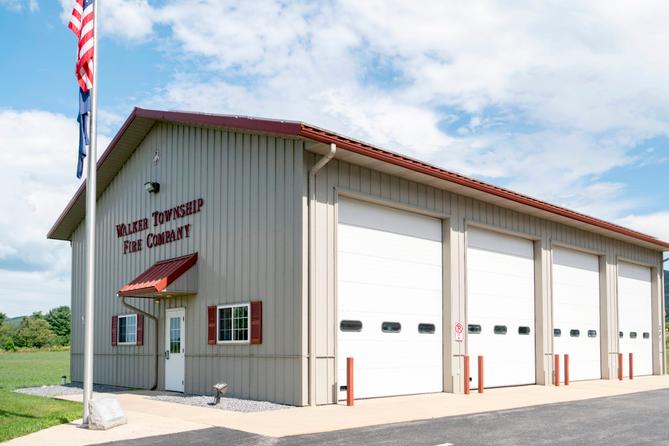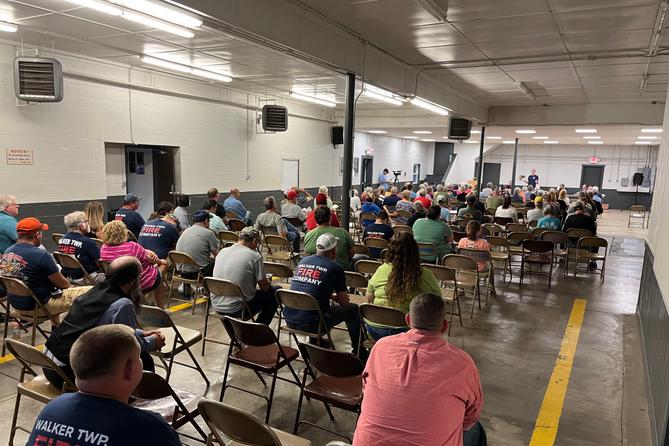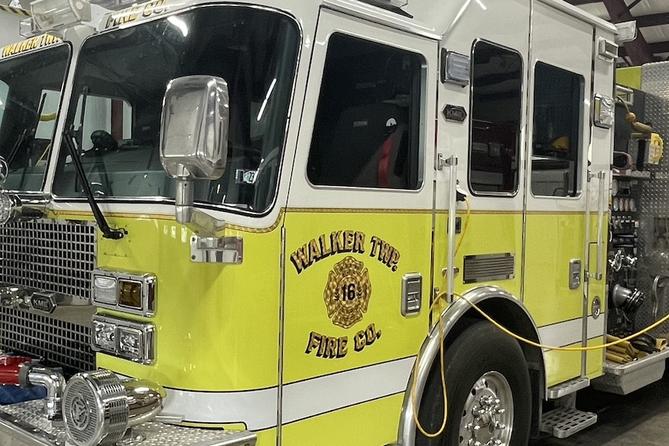This story was produced by the State College regional bureau of Spotlight PA, an independent, nonpartisan newsroom dedicated to investigative and public-service journalism for Pennsylvania. Sign up for our regional newsletter, Talk of the Town.
WALKER TOWNSHIP — On Pennsylvania Route 64 in Centre County, known locally as Nittany Valley Drive, what was once a stretch of farmland has become a bustling corridor. Gas stations, shops, and residential neighborhoods have brought more traffic and, invariably, more accidents.
The volunteer firefighters and rescuers responsible for this stretch respond to more incidents these days and also face an emergency of sorts of their own: The associated costs of their services are ballooning along with demand, and they fear they can no longer keep up with either.
Two of the most essential vehicles they operate — the rescue vehicle, a 1995 Freightliner, and the water tanker truck, a 1996 International — are nearing the ends of their lifespans. The estimated cost today to replace both would total more than $1 million.
But talks between the Walker Township Fire Company and the local board of supervisors on how to increase funding have come to an impasse. The fire company says a tax increase is the only way to secure its finances, but some local officials who oppose raising taxes disagree, and one wants to bundle increased funding with additional oversight of the company.
With vital emergency services on the line, the dispute reflects a larger shift in Pennsylvania, where volunteer fire companies say private donations have decreased and operational costs have climbed. As more of the state’s at least 1,800 volunteer companies turn to public tax dollars to stay afloat, a question arises — should more public funding come with more public oversight?

“This issue that [Walker Township is] dealing with has occurred many times across Pennsylvania, and it is going to continue to occur,” Jerry Ozog, executive director of the Pennsylvania Fire & Emergency Services Institute, said.
As part of Walker Township’s real estate taxes, residents currently pay $1 for every $1,000 of assessed value for fire company services — generating $116,726 in 2021. The fire company is asking the township to double the current municipal fire protection tax rate from one mill to two.
“We have a lot more residents and a lot more people to serve,” Township Supervisor Deb Zimmerman said.
Walker Township’s population grew nearly 12% from 2010 to 2020, from 4,224 to the current 4,728, according to Census Bureau data.
With that growth has come an increasing call volume for the Walker Township Fire Company, Fire Chief Chris Roan told Spotlight PA.
In 2021, the company — run by about 40 volunteer firefighters — responded to 171 calls, compared to a recent low of 115 in 2019, Roan said.
This April, three fatal crashes took place within eight days on a portion of state Route 64.
“This is life and death,” said Township Supervisor James Heckman.
Heckman, who says he has been a member of the Walker Township Fire Company for 55 years, supports giving the additional millage in fire tax.
“I just feel [with] the way the township’s growing, you got to back the fire company,” he said.
Walker Township Fire Company President Chris Harter said the current funding level does not allow his organization to budget for big purchases or long-term needs.
Because firefighting apparatus and gear have lifespan limits under National Fire Protection Association standards, the company estimates total expenses of $3.2 million through 2037 to keep up with those requirements.
“We started having negotiations in 2019,” Harter said. “That already cost the taxpayers about $300,000, because that’s how much [the price of] apparatus has gone up in that amount of time.”
Harter added that it could take two or three years for large purchases, like firetrucks, to be fulfilled. He said the company doesn’t have enough money to set aside and budget for that kind of spending right now.
“We would have to save for a down payment and then be able to go get a 2% loan and eventually purchase a piece of apparatus,” Harter said.
A Family Dispute
Chris Harter’s cousin Keith Harter, a Walker Township supervisor, said he agrees that the fire company needs more money, but he’d like to see a little more transparency from it first.
“The problem is we have issues with knowing exactly how it gets spent, [and] what it gets spent for,” Keith Harter said.
Keith Harter says he’s been a volunteer firefighter in Walker Township for 41 years. He told Spotlight PA he has supported the fire company in his capacity as a township supervisor, but feels responsible for ensuring taxpayer dollars are used transparently and with oversight.
When the COVID-19 pandemic shut down the fire company’s fundraising activities, the Walker Township Board of Supervisors approved two donations totaling $80,000 in 2020 to help the company cover losses and pay down debt.
In 2021, the township gave the company $125,000, which Chris Harter said paid off a loan the company had and allowed the company to apply for a new loan.
Both of the allocations came from the township’s general fund. Unlike revenues from the fire protection tax, which get transferred to an account the fire company holds, the money stayed within township control — a difference that Keith Harter said is significant.
“Being able to say, ‘Yes, they spent this much money on items. Here it is. We can show you,’” is critical for accountability, Keith Harter said. “The township is looking out for [residents’] tax dollars. And if we’re going to be giving the fire company, in essence, over a quarter of a million dollars a year of taxpayer money, we should know where it’s going exactly. Plain and simple.”
The fire company said it’s reviewing the way it handles the fire tax income, and is open to changing the practice of holding the money itself to make sure it follows best practices.
The fire company’s revenue consists of tax dollars, grants, and private donations. The public funding includes revenue from the fire tax, as well as workers’ compensation, which Walker Township is required to pay. The fire company’s most recent available tax filing, from 2020, shows that about 71% of its income came from public funding.
Because it’s a private nonprofit, the fire company is not subject to Pennsylvania’s Right-to-Know Law. The company is audited twice a year — the township auditor inspects the public funding the company receives and can flag any spending that’s not an approved use of taxpayer dollars, and the company hires a third-party certified public accountant to review its books, including all private donations.
With the majority of funding coming from taxpayers, Keith Harter said the township and the public should have the right to see detailed financial information as well as meeting minutes from when expenses are approved.
He and his fellow supervisor, Deb Zimmerman, proposed an ordinance that they say would guarantee funding increases for the fire company, and would create a three-person committee that works with the township to plan for fire company purchases.
“The whole idea behind this is, ‘Let’s really, truly determine your need,’” Zimmerman said. " I do not think they’re hiding anything. I just think they’re being very, very tight to the chest.”
But Chris Harter said he thought it was “a bad deal.”
“There were no financial numbers in it at all. There was no length of term of the ordinance,” he said. “I’m a firm believer of, if it’s not broken, why fix it? The fire tax was not broken. That’s worked well … . Why break it?”

Increasing Animosity
The disagreements have deepened as the fire company leadership has increasingly felt stonewalled by the supervisors, who counter that the company is unwilling to negotiate on any option other than a tax increase.
Walker Township Fire Company held a public meeting Aug. 16 where representatives from both camps made their case in front of more than 100 residents. The three-hour meeting became contentious, especially when township supervisors took the floor.
John Torres, a resident of Walker Township who attended the meeting, said he supports a tax increase because it’s “not a big ask,” given how necessary fire and rescue services are.
“To me this is a no-brainer. I don’t understand why this has dragged on,” Torres said.
The two annual audits of the fire company are enough to safeguard accountability, he argued, and the fire protection tax is “the cleanest, easiest, and really the least painful way to financially support them.”
Torres added that he sensed interpersonal conflict was getting in the way of the discussion, and that he wanted to see the animosity put aside for the good of the community.
“In best practices, we never want our private disputes to become public,” Ozog, with the Pennsylvania Fire & Emergency Services Institute, said. As a consultant, he has trained fire companies how to deal with operational challenges.
Ozog said the deadlock in Walker Township illustrates a larger shift in the working relationship between volunteer fire companies and local governments, as the business of running fire companies continues to change.
“What I recommend to fire companies is, you develop your budgets, you justify your case, and then you let the municipality figure out how to fund that,” Ozog said. “The best fire companies in Pennsylvania are the ones that have an excellent relationship with their local government. And when that relationship breaks down, this is what we see in Walker Township.”
Fire companies have to adjust to the reality that, as they grow more reliant on taxpayer dollars, they are going to “lose a little control,” he added.
“The complexity of running our organizations have dramatically changed,” Ozog said. “It’s hard.”
Chris Harter said he thinks there is room to improve on both sides.
“We’re not innocent in this either,” he said. “We need to have more open dialogue between each other. But when we were financially stable, we really didn’t have to go up and talk to them, like, we just did our thing, you know, and maybe that wasn’t healthy.”
He said the fire company will ask the board of supervisors for a formal vote on whether to increase the fire tax at the upcoming township board meeting Sept. 7.
SUPPORT THIS JOURNALISM and help us reinvigorate local news in north-central Pennsylvania at spotlightpa.org/statecollege. Spotlight PA is funded by foundations and readers like you who are committed to accountability and public-service journalism that gets results.

